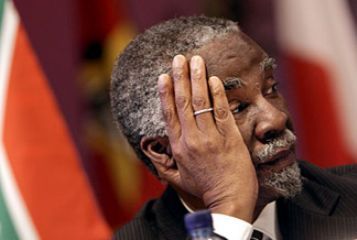Mbeki’s panel gets low rating by Sudan opposition following failed summit
February 25, 2010 (KHARTOUM) – The Sudanese opposition parties are beginning to question whether an African Union (AU) panel headed by the former South African president Thabo Mbeki can produce any results in implementing recommendations it put forward last year as part of roadmap to resolve the Darfur crisis in the context of a global political agreement.
 The AU High-Level Panel on Darfur (AUPD), later known as the AU High Level Implementation Panel (AUHIP), placed emphasis on reaching a peaceful settlement of the Darfur conflict before the April elections.
The AU High-Level Panel on Darfur (AUPD), later known as the AU High Level Implementation Panel (AUHIP), placed emphasis on reaching a peaceful settlement of the Darfur conflict before the April elections.
AUHIP was tasked with implementing all aspects of the AUPD recommendations and assist the Sudanese parties in the implementation of the 2005 Comprehensive Peace Agreement (CPA) and other related processes, as part of the democratic transformation of Sudan.
The Sudanese government while expressing reservations on the justice component has expressed support to the recommendations of the report and vowed to support the work of AUHIP.
But a failed attempt last week by Mbeki’s panel to bring together the ruling National Congress Party (NCP) and a handful of opposition parties underscored the challenges AUHIP will face amid deepening political tensions ahead of April elections and the 2011 referendum in South Sudan.
One of the opposition leaders who took part in the meetings with the panel has criticized it saying that it has so far “done nothing” since its establishment last October.
“We [opposition parties] have all expressed our unqualified support to Mbeki and his panel to fulfill its mandate and help Sudan resolve its mounting political problems” the opposition leader who asked not to be named told Sudan Tribune in an interview.
He revealed that Mbeki has agreed to sponsor the NCP-opposition conference and has provided the parties with a written agenda to be discussed which included “challenges facing Sudan at this juncture; conducting fair and free elections with sub-items tackling code of conduct and voter civic education; post-elections arrangements; Darfur conflict”.
However, the agenda was trimmed down by Mbeki for unknown reasons to the surprise of the opposition leaders prompting protests from them.
“We told him that we came for the specific agenda he furnished beforehand to discuss serious issues particularly setting up the proper legal framework for the elections to be held in a fair manner. The NCP wants to cherry-pick what to talk about and Mbeki bent to their pressure. This is unacceptable,” the opposition leader said.
A preliminary meeting was held between the NCP and opposition parties at the request of the latter to assess “whether the NCP is serious or not then we can decide how to proceed”.
The opposition leader said the session as moderated “poorly” by former Burundian president Pierre Buyoya who is part of the AUHIP.
“The SPLM representative Yen Mathew [SPLM spokesperson] was talking about the NCP signing agreements but not implementing it. The NCP delegate Mandoor Al-Mahdi [NCP political bureau Officer] raised a point of order which turned out to be a rebuttal to what Yen said” he said.
“When Yen asked Buyoya for an opportunity to respond he was turned down which angered Yen who left the room” he added.
The opposition leader said at subsequent meetings it appeared that the ruling party has no “genuine interest to make concessions” with regard to referendum, Darfur, CPA implementation, democratic transformation and elections.
He revealed that a few of their demands included disbanding the National Elections Committee (NEC) which he described as “lacking any credibility” and passing a bill that would freeze articles that would contravene laws allowing political association and assembly and freedom of movement.
“The minimum we will accept is freezing these laws. The SPLM already circulated a bill and all the NCP needs to do is agree to it,” he said.
Sudanese opposition parties allege that the National Security bill passed late last year grants wide powers to National Intelligence Security Service (NISS) including powers of arrest, search and seizure. The US has expressed dissatisfaction with the bill saying it will impede the ability to hold free elections.
The opposition leader said that their view of the AU is “extremely negative” but that he and others have “deep faith in the integrity of Mr. Mbeki”.
“But we feel that he has backtracked and failed the first crucial test in proving that he can deliver even in the face of stiff NCP resistance” he added.
Mbeki was irked by a remark made by Popular Congress Party (PCP) leader Hassan Al-Turabi who asked if the former South African leader “gave up on his report and his now just hanging on to the elections?”
One of the major action plans of the AUPD report is establishing a “hybrid Criminal Court” that would prosecute war crimes suspects in Darfur consisting of Sudanese and foreign judges. So far little has emerged on the progress of this proposal.
The opposition leader said that he and others feel that Mbeki is seeking a “media breakthrough that would pull the rug” from under joint AU-UN Chief mediator for Darfur Dijibril Bassole who is seeking to bring Khartoum and Darfur rebels to the negotiation table.
On Tuesday, the Justice and Equality Movement (JEM) signed a framework agreement with the Sudanese government that was hailed across the world and raised hope of resolving the seven year conflict.
Mbeki was recently touring African capitals reportedly seeking support to take over the Darfur dossier from the current Bassole, stressing that he can do more than the latter to push the parties toward talks.
(ST)
